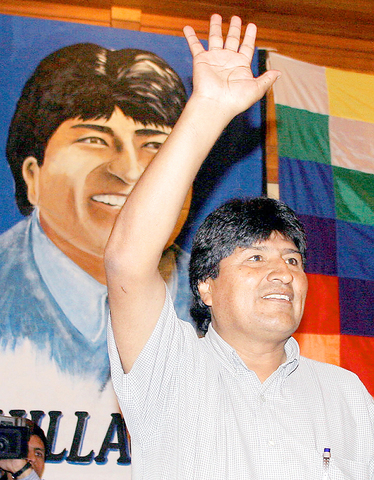With his stunning victory margin in Bolivia's presidential race, Evo Morales can claim more popular support than any president since democracy was restored in the Andean nation two decades ago.
The president-elect, an Aymara Indian who rose to prominence as a coca growing union leader, had 54.3 percent of the vote on Wednesday with 93 percent of polling places tallied, according to official returns. Turnout averaged almost 85 percent, much higher than in previous Bolivian elections, the electoral court said.
His outright majority in the eight-man race means Morales will be the first president since Bolivia returned to democratic rule in 1982 to be directly elected at the ballot box, with no need for congress to choose. He also would the first Indian president the 180-year history of Bolivia, which has an Indian majority.

PHOTO: AFP
Nearly 30 Mexican Indian groups on Wednesday sent a letter congratulating Morales, saying his victory was a historic triumph for Indians across the Americas that "lifts the spirits of out people."
The unexpected strength of his victory is one reason why widely held fears of post-electoral chaos have dissipated. Even Fitch Ratings, an international credit rating agency, kept Bolivia's credit rating unchanged Wednesday, saying Morales' government might have a greater degree of legitimacy than its recent predecessors and therefore lead to better governance.
Morales' supporters lack majority control in Bolivia's House and Senate, where many of the seats are still controlled by right-wing parties. But his wide victory should give him leverage with Bolivia's political and business elite as he makes the transition from a leader of street protests to his nation's standard-bearer, analysts say.
"If the opposition parties are seen as not being constructive and blocking everything Morales tries to do that would not be in their own interests," said Michael Shifter, vice president for policy at the Washington-based think tank Inter-American dialogue.
"I think that they initially would have to be pretty cooperative, recognizing that Morales has a very broad and impressive mandate," he said.
The National Electoral Court isn't expected to formally declare Morales the winner until all the votes are counted. But his victory margin has consistently increased as ballots arrive from his strongholds in remote areas of the country.
His conservative rival, Jorge Quiroga, conceded defeat after finishing with just 28.6 percent, and Bolivia's caretaker president is already organizing a transition team in anticipation of Morales' inauguration on Jan. 22.
Morales, 46, who turned to coca growing after tending llamas as a young boy, insists his government will fight drug trafficking while preserving a legal market for coca in Bolivia. People in the Andes chew coca to stave off hunger, make it into tea or use it as medicine.
also see stories:
Rhetoric aside, Morales must deliver
More of the same from Brazil's PT

STEPPING UP: Diminished US polar science presence mean opportunities for the UK and other countries, although China or Russia might also fill that gap, a researcher said The UK’s flagship polar research vessel is to head to Antarctica next week to help advance dozens of climate change-linked science projects, as Western nations spearhead studies there while the US withdraws. The RRS Sir David Attenborough, a state-of-the-art ship named after the renowned British naturalist, would aid research on everything from “hunting underwater tsunamis” to tracking glacier melt and whale populations. Operated by the British Antarctic Survey (BAS), the country’s polar research institute, the 15,000-tonne icebreaker — boasting a helipad, and various laboratories and gadgetry — is pivotal to the UK’s efforts to assess climate change’s impact there. “The saying goes

FRUSTRATIONS: One in seven youths in China and Indonesia are unemployed, and many in the region are stuck in low-productivity jobs, the World Bank said Young people across Asia are struggling to find good jobs, with many stuck in low-productivity work that the World Bank said could strain social stability as frustrations fuel a global wave of youth-led protests. The bank highlighted a persistent gap between younger and more experienced workers across several Asian economies in a regional economic update released yesterday, noting that one in seven young people in China and Indonesia are unemployed. The share of people now vulnerable to falling into poverty is now larger than the middle class in most countries, it said. “The employment rate is generally high, but the young struggle to

ENERGY SHIFT: A report by Ember suggests it is possible for the world to wean off polluting sources of power, such as coal and gas, even as demand for electricity surges Worldwide solar and wind power generation has outpaced electricity demand this year, and for the first time on record, renewable energies combined generated more power than coal, a new analysis said. Global solar generation grew by a record 31 percent in the first half of the year, while wind generation grew 7.7 percent, according to the report by the energy think tank Ember, which was released after midnight yesterday. Solar and wind generation combined grew by more than 400 terawatt hours, which was more than the increase in overall global demand during the same period, it said. The findings suggest it is

TICKING CLOCK: A path to a budget agreement was still possible, the president’s office said, as a debate on reversing an increase of the pension age carries on French President Emmanuel Macron yesterday was racing to find a new prime minister within a two-day deadline after the resignation of outgoing French Prime Minister Sebastien Lecornu tipped the country deeper into political crisis. The presidency late on Wednesday said that Macron would name a new prime minister within 48 hours, indicating that the appointment would come by this evening at the latest. Lecornu told French television in an interview that he expected a new prime minister to be named — rather than early legislative elections or Macron’s resignation — to resolve the crisis. The developments were the latest twists in three tumultuous